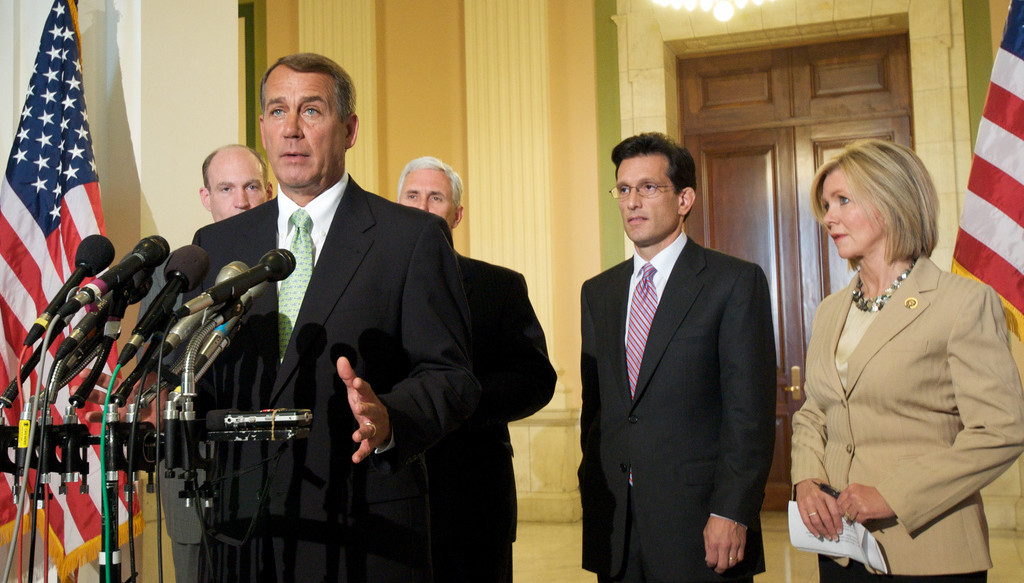Welcome back, readers! For those of you who celebrate Thanksgiving, I hope your holiday was swell. Mine was marred by the sudden onset of a cold, but not even a sore throat and aching head could stop me from bringing up some important Supreme Court shenanigans that happened on Monday, November 26. First, The Nine gave a summary ruling for a case they had originally agreed to hear (Nitro-Lift Technologies, L.L.C. v. Howard—they vacated the Oklahoma Supreme Court’s judgment and remanded the case). Then, in a move that’s been vexing me all day, the Court agreed to send the case Liberty University v. Geithner to the Fourth Circuit Court (located in Richmond, VA) “for further review.”
Liberty University v. Geithner (see here, here, or here for more information) is a case started by the well-known, conservative, Christian university (in Lynchburg, VA) to challenge two key facets of 2010’s Affordable Care Act: the individual mandate, which requires all individuals to purchase healthcare or pay a penalty, and the requirement that all employers with upwards of fifty employees must provide their employees with “adequate insurance coverage.” Liberty University argues that both mandates “violate rights to religious freedom or to legal equality under the Constitution,” and also contends that the employer mandate was enacted outside of Congress’ Necessary and Proper or Commerce Clause powers.
Last Term, the Supreme Court refused to hear the case, but they sent it back to the Fourth Circuit on Monday despite the fact that the Fourth Circuit had previously refused to rule on any of Liberty University’s claims. The Fourth Circuit ruled that the University was barred from bringing suit by the Anti-Injunction Act, which states that a tax cannot be challenged until the tax must actually be paid. The Affordable Care Act in its entirety does not go into effect until 2014, so, theoretically, under the Anti-Injunction Act, Liberty University could not yet bring a case against the individual mandate. The Supreme Court just vacated and remanded this decision, though, so the Fourth Circuit will have to revisit this issue and pass judgment on the University’s various arguments.
The Court’s decision to vacate and remand Liberty University v. Geithner is a strange one, in my opinion—they already ruled that the individual mandate was constitutional as a tax, though not under Congress’ Commerce Clause powers (and Chief Justice Roberts was the swing vote!), and last term they did not rule on the employer mandate. So what do the justices stand to gain by sending Liberty University v. Geithner back to the Fourth Circuit? It makes sense that they might want to rule on the employer mandate, because they did not last term, but then why not just remand that challenge and disregard the individual mandate issue? Don’t make me say it again, Supreme Court… you already decided on the individual mandate’s constitutionality.
I suppose that it might be good to address Liberty University’s claim that the individual mandate violates certain Bill of Rights freedoms, because I can’t understand how one’s freedom of religion is violated by the individual mandate (members of certain religious sects recognized by the IRS are already exempt). It would also be good to speak to Liberty University’s claim that the individual mandate violates legal equality, because I see no way in which the individual mandate changes anyone’s standing in the eyes of the law. (For example, does the requirement that I find coverage with an employer, buy private healthcare, or pay a penalty suddenly violate my right to due process? Definitely not.) And, to play devil’s advocate, it’s not unheard of for the Supreme Court to rule upon issues that it has already tackled. In fact, it’s often a good idea! What if we had never reassessed the issues afoot in Plessy v. Ferguson or Dred Scott v. Sandford? The Court does make mistakes.
But did the Supreme Court make a mistake with its individual mandate ruling? And is it really necessary to rule on the employer mandate’s constitutionality right at this moment? The Court decided to ignore that problem for the time being, and will come back to it in time. I think it’s a little soon to be revisiting the individual mandate and opening the floodgates for the employer mandate, especially considering the fact that the law will not go into effect until 2014. We have all of 2013 to get through first, and there are a lot of issues that are more pertinent than a law that’s dormant for another year. (Gay marriage, anyone? Affirmative action? Oh, wait… it’s a good thing those cases are already in the pipeline.) So, fine, nine Justices, let the Fourth Circuit figure out what’s going on. But don’t get pulled back into the Affordable Care Act mire that took an unprecedented three days’ worth of oral argument when you’ve already got a decision that makes sense. Or, if you really want to rule on the subject, at least wait until 2014. Please. At the moment, you’ve got bigger fish to fry.
